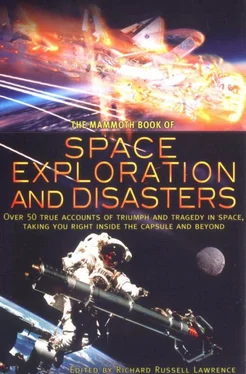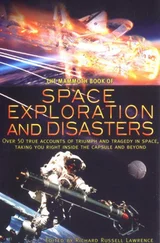“We noticed these little things. What was different about Mike was he started studying everything right away. He said, ‘Show me how everything works.’ And we gave him things to do. He asked all the right questions. Mike amazed us by mastering [systems] theory sometimes better than we knew it. He was like a child, and he was growing, and he grew into a real cosmonaut engineer.”
Tsibliyev recalled:
“When Michael first came on the station, the three of us were sitting around the table, and Michael said, ‘I came here to make you happy with me.’ He didn’t say he came to make himself happy. He came to make us happy. The fact that he integrated into the crew was because of these qualities.”
There was another coolant leak. Lazutkin found it in a crack in a pipe in Kvant. When Tsibliyev got a globule of coolant full in the face it took him three days to recover. By this time he was already tired and stressed.
An unmanned Progress supply vessel crashes into Mir
On 25 June a Progress was due. They were to repeat the docking test, taking over control of the supply vessel from 7km out, but this time they would be out of communication with TsUP until the Progress was 50m from Mir. If a docking was aborted while the Progress was over 400m away it would miss Mir. Within that distance no one knew what would happen. TsUP told Tsibliyev that the Progress was approaching on schedule. This time the camera on the Progress worked but the automatic docking system (BPS) did not. The BPS signalled that the Progress was ready to fire its thrusters but 17 minutes from docking there was no receipt signal. Tsibliyev switched to manual docking using the TORU and sent Foale to Kvant to check the distance using a laser range finder. The Kurs radar which could provide that information had been automatically switched off. There was a possibility that this had caused failure of the camera on board the Progress. At this point they couldn’t see the Progress either on screen or through a window, although they estimated it was only 2.5km out.
At 12:06:51, with Lazutkin and Foale floating silently behind him, looking out their windows, Tsibliyev released the braking lever. According to the instructional memo, the Progress should have been just a kilometre or slightly less above them, moving down toward the docking port. Once the ship arrived at a point about 400 metres away from the station, Tsibliyev would slow its speed to a crawl and begin inching it forward to the 50-metre point, where it would be readied for a soft docking at the Kvant docking port.
When the TsUP’s plan had 90 seconds to go the Progress should have been approaching the 400-metre mark, but neither Lazutkin, peering out of window No.9, nor Foale could see anything. Both men knew the ship had to be out there somewhere, just beyond their view; on the screen, the station now filled four entire squares on the checkerboard overlay. An eerie feeling washed over Lazutkin. Looking at Tsibliyev’s screen, he felt as if he was being watched. But no matter what they did, they could not find the onrushing watcher.
Tsibliyev nudged the braking lever one final time.
“It’s moving down,” he said.
Suddenly Lazutkin spotted the oncoming Progress, emerging from behind a solar array that until that moment had blocked his view. The ship appeared huge – bigger than he could have imagined.
It was heading right for them.
“My God, here it is already!” Lazutkin yelped.
Tsibliyev couldn’t believe it.“What?”
“It’s already close!”
“Where is it?”
Now everything began to happen fast. As Lazutkin looked out through the window, the brightly sunlit Progress appeared to be heading straight for a collision with base block, its twin solar arrays making it appear like some shiny white bird of prey swooping down on them.
“The distance is one hundred fifty metres!” he shouted.
Tsibliyev thought Lazutkin must be mistaken. His left pinkie remained clamped on the braking lever. The Progress should have been moving at a crawl.
“It’s moving closer!” Lazutkin said. He looked outside again and saw the big ship coming on inexorably.“ It shouldn’t be coming in so fast!”
“It’s close, Sasha, I know; I already put it down!”
Tsibliyev was holding the controls tightly, his left pinkie clamped on the braking lever. The ship should have been slowing. It didn’t seem to be responding.
To his horror, Lazutkin saw the Progress pass over the Kvant docking port and begin moving down the length of base block.
Tsibliyev saw it on the screen.
“We are moving past!” he shouted.
Lazutkin remained glued to the window.
“It’s moving past! Sasha, it’s moving past!”
Lazutkin watched the Progress come on then turned to Foale.
“Get into the ship, fast!” he told Foale, directing him to the Soyuz.
“Come on, fast!”
Foale, who had still not seen the Progress, acted quickly, pushing off the wall, shooting across the dinner table, and hurled over Tsibliyev’s head toward the Soyuz, which rested at its customary docking port on the far side of the node. Then, just as Foale passed over the commander, something happened that may or may not have had a profound effect on all their lives. One of Foale’s feet whacked Tsibliyev’s left arm. Later, everyone on board disagreed on the effect this accidental bump may have had on the path of the onrushing Progress.
As Foale passed, Tsibliyev sat frozen at the controls, his face a mask of concentration. He was convinced he could keep the Progress out away from the station, that if he held tightly enough to its current course it would still miss them. Not until the last possible second, when the hull of the station ominously filled his entire screen, did the commander realize there was no avoiding a collision.
“Oh, hell!” Tsibliyev yelled.
As the black shadow of the Progress soared by his window, Lazutkin closed one eye and turned his head.

The impact sent a deep shudder through the station. To Lazutkin, still glued to the base block window, it felt like a sharp, sudden tremor, a small earthquake. Foale, swimming through the node toward the open mouth of the Soyuz, felt the violent vibration when his hand brushed the side of the darkened chamber.
“Oh!” Tsibliyev shouted, as if in pain. He stared at his screen, barely comprehending what had happened. He said aloud, “Can you imagine?”
The master alarm sounded, eliminating all but shouted conversation.
“We have decompression!” Tsibliyev yelled. “It looks like it hit the solar panel! Hell! Sasha, that’s it!”
Confusion broke out as Lazutkin turned and began to swim toward the node, intent on readying the Soyuz for immediate evacuation.
“Wait, come back, Sasha!” Tsibliyev barked.
It was the first decompression aboard an orbiting spacecraft in the history of manned space travel. As Lazutkin hovered beside him, waiting for an order, Tsibliyev remained at his post, staring at the screen, like the captain of a stricken ship.
“How can this be?” he asked.“How can this be?”
After that his words were drowned out in the manic din of the master alarm.
Floating alone in the node, Foale paused. After a moment he realized he was still alive. His ears popped, just a bit, telling him that whatever hole had been punctured in the hull, it was probably a small one. The station’s wounds, whatever they were, were not immediately fatal. They should have enough time to evacuate.
Читать дальше













